endocrine system MCQs with answers for neet-CBSE-JAC exams and lesson- endocrine glands and endocrine system MCQs with answers for neet-CBSE-JAC exams
■subtopics:- endocrine glands and endocrine system MCQs with answers for neet-CBSE-JAC exams
■introduction :- endocrine glands and endocrine system MCQs with answers for neet-CBSE-JAC exams,students might be busy in your preparation for coming CBSE ,12th board Jharkhand academic Council exams
and other state board exam biologysir.com will provide many type of education material like fill in the blanks, true or false matching type questions ,multiple choice questions, very short questions answers type, short questions answer type and long questions type of 12th class Biology from each topic that help you in your preparation and endocrine glands and endocrine system MCQs with answers for neet-CBSE-JAC exams
*In this post :- we provide you endocrine glands and endocrine system MCQs with answers for neet-CBSE-JAC exams and MCQs test sample with answer from the endocrine glands and endocrine system biologysir.com
mcq in biology endocrine system
1) duct bearing glands is known as which of following
A) endocrine glands
B) exocrine glands
C) heterocrine glands
D) partially endocrine glands
And. B
2) which of the following is the ductless gland
A) endocrine glands
B) exocrine glands
C) heterocrine glands
D) partially endocrine glands
Ans. A
3) which of the following is partially endocrine and partially exocrine in function
A) endocrine glands
B) exocrine glands
C) heterocrine glands
D) partially endocrine glands
Ans. C
◆you should also visits our website https://biologysir.com and other website for civil engineer calculation at https://www.civilsir.com
■ follow on YouTube
◆name of fathers in field of Biology
● all full forms of 11th and 12th Biology
4) which type of gland is known as glands of internal secretion
A) endocrine glands
B) exocrine glands
C) heterocrine glands
D) partially endocrine glands
Ans. A
5) which type of gland secretes hormones
A) endocrine glands
B) exocrine glands
C) heterocrine glands
D) partially endocrine glands
Ans. A
6) which type of gland secretes enzyme
A) endocrine glands
B) exocrine glands
C) heterocrine glands
D) partially endocrine glands
Ans. B
7) which glands are found under the skin
A) salivary glands
B) Sebaceous gland
C) gastric glands
D) and liver
Ans. B
8) which glands are present in buccal cavity
A) salivary glands
B) Sebaceous gland
C) gastric glands
D) and liver
Ans. A
9) glands are present in stomach wall
A) salivary glands
B) Sebaceous gland
C) gastric glands
D) and liver
Ans. C
10) which glands are heterocrine in function
A) pancreas
B) gonads
C) both A and B
D) liver
Ans. C
11) the branch of Biology which deals with the study of endocrine glands and role of their secretion is known as which of following
A) cell biology
B) embryology
C) endocrinology
D) neuroendocrinology
Ans. C
12) which one of the following is messenger molecules in our body
A) carbohydrates
B) proteins
C) fats
D) Hormones
Ans. D
13) hormones was discovered by
A) Bateson
B) Haeckel
C) Starling
D) none
Ans. C
14) which one of the following is amino acid derivatives hormones
A) epinephrine and norepinephrine and thyroxine
B) Oxytocin vasopressin and melanocyte stimulating hormone
C) gonadotropic somatotrophic and thyrotropic
D) testosterone and relaxin
Ans. A
15) which one of the following is peptide hormone
A) epinephrine and norepinephrine and thyroxine
B) Oxytocin vasopressin and melanocyte stimulating hormone
C) gonadotropic somatotrophic and thyrotropic
D) testosterone and relaxin
Ans. B
16) which one of the following is protein derivatives hormone
A) epinephrine and norepinephrine and thyroxine
B) Oxytocin vasopressin and melanocyte stimulating hormone
C) gonadotropic somatotrophic and thyrotropic
D) testosterone and relaxin
Ans. C
17) which one of the following is steroid hormone
A) epinephrine and norepinephrine and thyroxine
B) Oxytocin vasopressin and melanocyte stimulating hormone
C) gonadotropic somatotrophic and thyrotropic
D) testosterone and relaxin
Ans. D
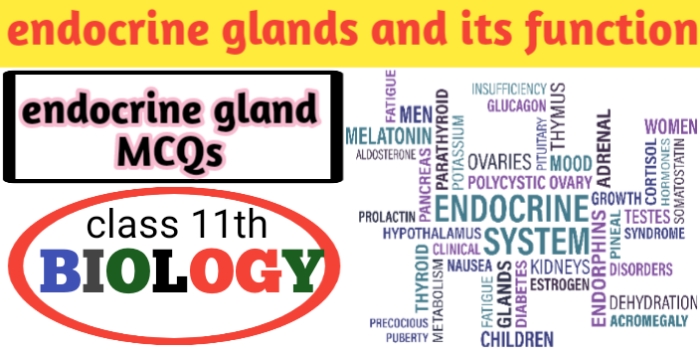
endocrine system MCQs with answers for neet-CBSE-JAC exams
18) many hormones such as peptide which are secreted in inactive form are called as which of the following
A) prohormones
B) hormones
C) enzyme
D) vitamins
Ans. A
19) which one of the following is largest endocrine gland
A) thyroid glands
B) pituitary glands
C) hypothalamus
D) parathyroid glands
Ans. A
20) which one of the following is largest exocrine glands
A) thyroid glands
B) pituitary glands
C) hypothalamus
D) liver
Ans. D
21) which one is primary target of the hypothalamic hormone
A) thyroid glands
B) pituitary glands
C) hypothalamus
D) parathyroid glands
Ans. B
22) which one is Catecholamines
A) thyroid glands
B) pituitary glands
C) hypothalamus
D) secretion from adrenal medulla
Ans. D
23) the presence of excess of glucose in blood causes release of which hormone
A) insulin hormones
B) glucagon hormones
C) thyroxine
D) oxytocine
Ans. A
24) the release of two hormone adrenaline and noradrenaline are due to
A) presence of specific metabolite
B) presence of other hormones
C) Neuronal impulse
D) none
Ans. C
25) which two hormones are released during anxiety, stress and danger
A) adrenaline and noradrenaline
B) LH
C) FSH
D) oxytocine
Ans. A
26) which hormones are soluble in lipids
A) amino acid derivatives hormone
B) peptide hormones
C) proteinaeous hormone
D) steroid hormones
Ans. D
27) which hormones are insoluble in lipids
A) amino acid derivatives hormone
B) peptide hormones
C) proteinaeous hormone
D) all of these
Ans. D
28) which enzyme is released from the receptor site
A) carboxylase
B) hydroxylase
C) carbonic anhydrase
D) adenylate cyclase
Ans. D
29) hormone receptor complex is formed by release of which enzyme
A) carboxylase
B) hydroxylase
C) carbonic anhydrase
D) adenylate cyclase
Ans. D
30) which activate the release of hormone adenylate cyclase
A) cAMP
B) ATP
C) GTP
D) CTP
Ans. A
31) in hormone receptor Complex which one is first messenger
A) hormones
B) vitamins
C) enzyme
D) cAMP
Ans. A
32) in hormone receptor Complex which one is second messenger
A) hormones
B) vitamins
C) enzyme
D) cAMP
Ans. D
33) what is main function of hormone receptor complex
A) increase the thickness of cell membrane
B) increase the permeability of cell membrane
C) decrease the thickness of cell membrane
D) it rupturing the cell membrane for permeability
Ans. B
34) what is the subunit of insulin hormone
A) 2 alpha and 2 Beta subunit
B) 2 alpha and 1 Beta subunit
C) 1 alpha and 1 Beta subunit
D) 3 alpha and 4 Beta subunit
Ans. A
35) which one of the following is act as amplifing of signal
A) IP3 and DG
B) cAMP
C) G-protein
D) PIP2
Ans. A

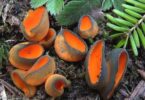
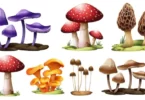
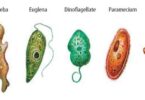
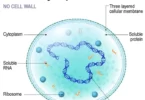
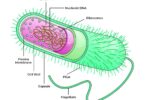
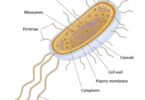
Leave a Comment